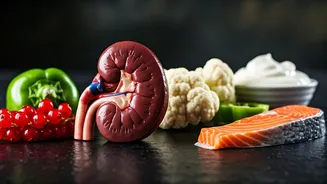Understanding Kidney Health
Kidneys are fundamental in maintaining overall health. Their primary role involves filtering waste products and excess fluids from the bloodstream, which
are then eliminated through urine. These bean-shaped organs also regulate blood pressure, control electrolyte balance, and activate vitamin D for bone health. The kidneys are susceptible to damage from various factors, including diseases such as diabetes and high blood pressure, and unhealthy dietary choices. Regular consumption of processed foods, excessive salt, and inadequate hydration can burden the kidneys. Prioritizing a kidney-friendly diet that includes foods that promote detoxification is essential to supporting and maintaining kidney health. This proactive approach supports the kidneys’ natural functions, thus preserving overall well-being.
The Power of Cranberries
Cranberries are renowned for their potential to prevent urinary tract infections (UTIs). The bioactive compounds found in cranberries, such as proanthocyanidins (PACs), prevent bacteria, specifically E. coli, from adhering to the urinary tract walls. This is especially crucial for preventing infections, which can, if left untreated, potentially affect the kidneys. Cranberries also contain antioxidants, which help fight inflammation and oxidative stress. However, it's essential to consume cranberries without added sugars to maximize their benefits. Fresh or unsweetened cranberry juice, and dried cranberries are better options. Including cranberries as part of a balanced diet can contribute to kidney health, especially by supporting the urinary system and helping prevent infections.
The Magic of Red Bell Peppers
Red bell peppers are an excellent source of nutrients that are kidney-friendly. They are particularly low in potassium, which is crucial for individuals with kidney problems, as the kidneys may not be able to effectively regulate potassium levels. These colorful vegetables are also packed with antioxidants, especially vitamins C and A, which combat free radicals and reduce oxidative damage. Red bell peppers also offer fiber, which promotes digestive health. They can be included in various meals. Raw red bell peppers can be added to salads, they can be roasted as a side dish, or incorporated into stir-fries. The versatility of red bell peppers makes them a simple addition to a kidney-healthy diet, providing essential nutrients without overburdening the kidneys.
Cauliflower's Kidney Benefits
Cauliflower is a versatile vegetable, and its low potassium content makes it suitable for kidney health. It contains vitamins C, K, and folate, which support overall well-being. Additionally, cauliflower is a good source of fiber, which helps in the digestion process. Including more fiber can help remove waste products and maintain healthy cholesterol levels. Cauliflower can be prepared in numerous ways, such as steaming, roasting, or pureeing. It can be used as a substitute for other carbohydrate-rich foods. The vegetable can be a part of the diet, and it may promote kidney health. The diverse range of culinary uses makes it easy to incorporate into various meals.
The Role of Garlic
Garlic is a flavorful food known for its potential health benefits, including protecting kidney health. It contains antioxidants, which help to combat inflammation. Regular consumption of garlic can help reduce the risk of chronic diseases, and protect the kidneys. Garlic is a good source of allicin, a compound with anti-inflammatory and antioxidant properties. It can be added to a lot of foods. Garlic can be used to season a variety of dishes, such as soups, stews, and stir-fries. Although garlic should be used in moderation, its potential health benefits, coupled with its culinary versatility, make it a valuable addition to a kidney-healthy diet.
Onion and Kidney Health
Onions are another food that can be included in a kidney-friendly diet. Onions are a good source of antioxidants and compounds that can fight inflammation. They are also low in potassium, which is helpful for individuals with kidney concerns. The antioxidants in onions help to neutralize harmful free radicals, which can damage kidney cells. Incorporating onions into the diet provides a savory taste and supports kidney health. Onions can be added to almost any savory dish, providing both flavor and nutritional benefits. They can also be eaten raw in salads, or can be used for flavoring. Considering their ease of use and nutritional benefits, onions can be a part of a kidney-healthy diet.


















